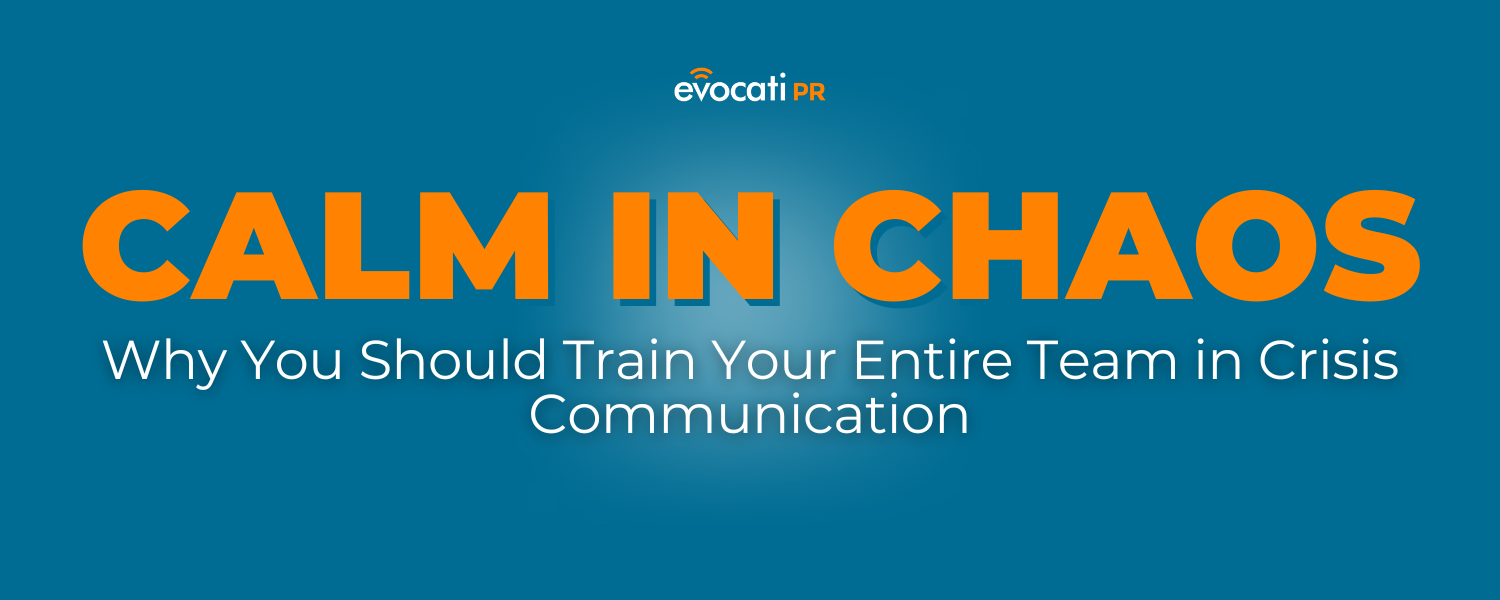Striking a Balance: Managing Ethical Communications in a Crisis Response
You have to behave ethically, strategically, and quickly in a crisis, but how do you navigate the endless pitfalls associated with crisis response?
It's Only a Matter of Time
No matter how beloved and transparent your business or brand is, a crisis can strike at any time. Whether you are caught in a lie or hypocrisy, taken out of context, or there is a blatant lie or miscommunication, no one is ever safe from crisis. This is where your preparation and patience become an asset.
READ MORE: Crisis Communication: What is it and Why Is It Essential For Entrepreneurs? | Evocati PR
Before we explore the link between providing an ethical response to a crisis, let's revisit what we published earlier about crisis communication:
"The reality is that your business will face a PR crisis whether you like it or not. Sometimes, they strike before we've had a chance to create a crisis response team, develop template statements, put together a response plan, or even place preventative measures in motion.
Of course, this is not an ideal situation, and it's one that we hope you and your business will never encounter. However, as entrepreneurs and leaders, we must always press forward for the benefit of our business and manage the crisis as best as possible."
READ MORE: What to do When You're in Crisis Without a Crisis Response Plan | Evocati PR
"In today's 24/7 news cycle—along with the rise of social media—the way in which an organization responds to a crisis can make or break its reputation, sometimes permanently."
When a PR crisis hits, your business should be prepared to respond. But you should also be prepared to do so ethically. Here's how.
The Unbreakable Link Between Ethics and Effective Crisis Communications
Communication, especially in a crisis, can be a double-edged sword. In the haste to manage a crisis, it's all too easy to value speed above all and leave in-depth research and ethical considerations behind.
Speed is not more important than accuracy and honesty. You will never lie your way out of a crisis. If you lie, the public will find out, and that will lead to a worse outcome than wrongdoing. Lying in a crisis guarantees an additional PR crisis on the horizon—something agencies like ours do not enjoy managing.
Let's review the importance of ethics in your crisis response: Imagine you find yourself in a crisis because an out-of-context clip or quote of you surfaces on Twitter, and it seems that everyone in the world is rallying behind a common enemy; you. You've been targeted for cancellation. Your response can either reaffirm to everyone that they are right or make them take a step back and realize they were misled. That choice is up to you, but we know which one we'd recommend. Go direct.
You have to push the real, factual information to the forefront, in its entirety. You have to go direct. If this is from an interview, push the full interview. If this is from a podcast, send the episode link. You also have to avoid alienating those who were misled. With a clear and concise message, you can get your message out without vilifying anyone who fell for the ruse. If you react emotionally, you are likely to reload their weapons instead of cooling their barrels.
Crisis Communications Unveiled
(Source: Unsplash.com)
You can pretend a crisis won’t happen or turn it into an opportunity before it happens. In an ideal world, you don't face a crisis unprepared—90% of crisis management is preparation before a crisis strikes. Meaning, without a crisis communications plan, you are steps behind when a situation does break out. The best part of managing ethics during prep? You have time, so be deliberate and experiment until you have found the voice of reason your audience needs to hear regarding the situation.
Crisis management at its heart is about making tough decisions in high-stakes environments. The ethical dimension adds a layer of complexity; the 'right' thing to do is not always the most apparent or the most popular option. Yet, ethical considerations must inform every aspect of how an organization tackles a crisis.
The moral integrity of the response directly shapes how stakeholders—be they shareholders, customers, or the public—perceive the company during and after the PR storm. Transparency, accountability, and honesty dovetail with ethical guidelines. However, in the midst of a crisis, revealing damaging information in a timely manner can be as risky as withholding it.
Balancing Act: Ethics and Efficacy
The challenge for PR crisis managers is to balance the need for efficacy with ethical responsibility. Communicating too little, too late, or with a hint of cover-up risks deepening the crisis, while oversharing can needlessly alarm or damage stakeholders' trust. Striking the right balance is an art as well as a science, an art that first requires a deep understanding of an organization's ethics and then the strategic application of these principles.
Conclusion
Pubic relations doesn't have higher stakes than crisis communication. How a company communicates during a crisis can define its future, for better or worse. You can't leave ethics behind in the pursuit of managing a crisis. Transparency, fairness, and morality should be at the forefront of every decision you make, every word you speak, and every step of your communication.





